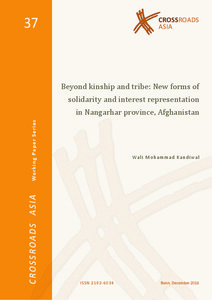Kandiwal, Wali Mohammad: Beyond kinship and tribe: New forms of solidarity and interest representation in Nangarhar province, Afghanistan. Bonn: Competence Network Crossroads Asia: Conflict – Migration – Development, 2016. In: Baldauf, Ingeborg; Conermann, Stephan; Kreutzmann, Hermann; Nadjmabadi, Shahnaz; Reetz, Dietrich; Schetter, Conrad; Sökefeld, Martin; Bech Hansen, Claus Erik; Hornidge, Anna-Katharina; Mielke, Katja (Hrsg.): Crossroads Asia Working Paper Series, 37.
Online-Ausgabe in bonndoc: https://hdl.handle.net/20.500.11811/528
Online-Ausgabe in bonndoc: https://hdl.handle.net/20.500.11811/528
@techreport{handle:20.500.11811/528,
author = {{Wali Mohammad Kandiwal}},
editor = {{Ingeborg Baldauf} and {Stephan Conermann} and {Hermann Kreutzmann} and {Shahnaz Nadjmabadi} and {Dietrich Reetz} and {Conrad Schetter} and {Martin Sökefeld} and {Claus Erik Bech Hansen} and {Anna-Katharina Hornidge} and {Katja Mielke}},
title = {Beyond kinship and tribe: New forms of solidarity and interest representation in Nangarhar province, Afghanistan},
publisher = {Competence Network Crossroads Asia: Conflict – Migration – Development},
year = 2016,
month = dec,
series = {Crossroads Asia Working Paper Series},
volume = 37,
note = {In this paper, I show that the establishment of unauthorized settlements on government land in the newly urbanizing peripheries of Jalalabad – the second-fastest growing city of Afghanistan – corresponded with the emergence of a new type of interest representation manifest in locally established inclusive interest representation bodies (shura). Taking the example of two evolving settlements, I aim to illustrate how two newly established shuras, based on inclusive social – albeit not tribal or kinship-based – representation of all resident households, present a new mode of solidarity mechanism in urbanizing Pashtun society.},
url = {https://hdl.handle.net/20.500.11811/528}
}
author = {{Wali Mohammad Kandiwal}},
editor = {{Ingeborg Baldauf} and {Stephan Conermann} and {Hermann Kreutzmann} and {Shahnaz Nadjmabadi} and {Dietrich Reetz} and {Conrad Schetter} and {Martin Sökefeld} and {Claus Erik Bech Hansen} and {Anna-Katharina Hornidge} and {Katja Mielke}},
title = {Beyond kinship and tribe: New forms of solidarity and interest representation in Nangarhar province, Afghanistan},
publisher = {Competence Network Crossroads Asia: Conflict – Migration – Development},
year = 2016,
month = dec,
series = {Crossroads Asia Working Paper Series},
volume = 37,
note = {In this paper, I show that the establishment of unauthorized settlements on government land in the newly urbanizing peripheries of Jalalabad – the second-fastest growing city of Afghanistan – corresponded with the emergence of a new type of interest representation manifest in locally established inclusive interest representation bodies (shura). Taking the example of two evolving settlements, I aim to illustrate how two newly established shuras, based on inclusive social – albeit not tribal or kinship-based – representation of all resident households, present a new mode of solidarity mechanism in urbanizing Pashtun society.},
url = {https://hdl.handle.net/20.500.11811/528}
}






